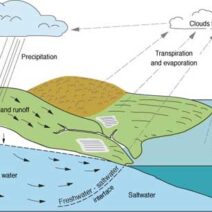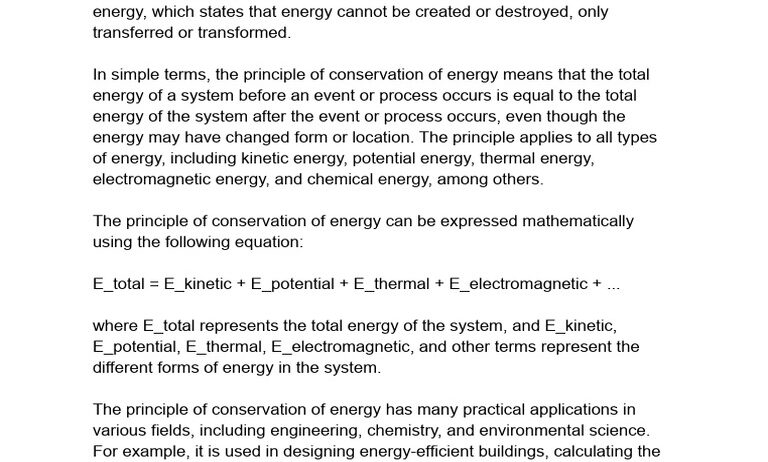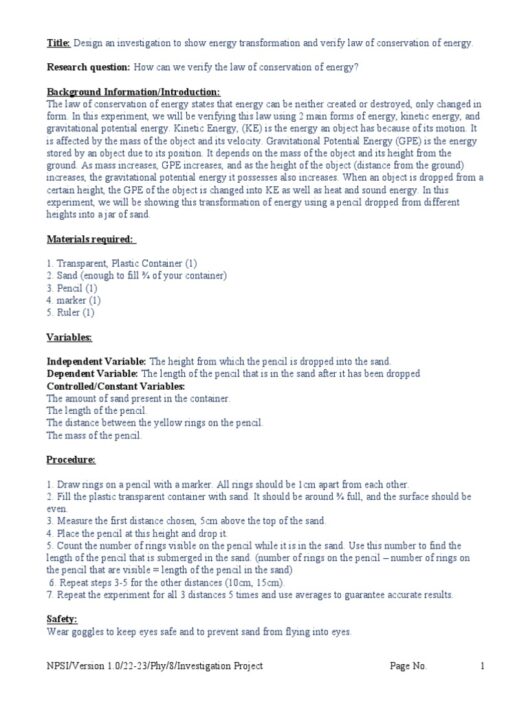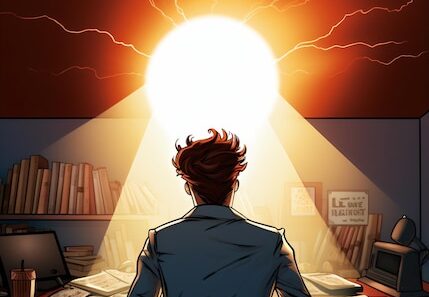The notion of energy conservation transcends mere physical principles; it embodies a philosophy that challenges our understanding of nature and the mechanisms that govern our universe. At its essence, the principle of energy conservation posits that energy cannot be created or destroyed; it merely transforms from one form to another. This immutable law of physics beckons us to rethink our relationship with energy and the resources we consume. By delving deeper into what it means when energy is conserved, we can unveil a world of possibilities that demand our curiosity and reshape our perspective.
Energy conservation serves as a cornerstone in various fields, from thermodynamics to ecology. This article will explore the fundamental aspects of energy conservation, its implications in our everyday lives, and the broader significance it holds for the future of our planet.
The Framework of Energy Conservation
In a universe governed by the laws of thermodynamics, energy conservation emerges as a critical tenet. Simply put, the first law of thermodynamics asserts that the total energy of an isolated system remains constant. This equilibrium reinforces the idea that energy undergoes continuous transformation. Consider a pendulum, swinging seamlessly back and forth. As it ascends, kinetic energy transforms into potential energy, only to revert back as it descends. This endless dance of energy forms exemplifies a principle that extends into everyday occurrences, from the food we consume to the heating of our homes.
It’s not just about individual entities, though. This principle applies on a grander scale, encompassing ecological systems, social constructs, and technological advancements. A thorough understanding of energy conservation deepens our appreciation for the interconnectedness of all things. It instills a sense of responsibility, urging us to act sustainably and ensure that our consumption patterns do not jeopardize the delicate balance of the world around us.
What Does It Mean to Conserve Energy?
Energy conservation, in the context of human action, refers to the deliberate efforts to reduce energy use without compromising our standard of living. This involves recognizing the multifaceted nature of energy consumption—from reliance on fossil fuels to the adoption of renewable energy sources. The choices we make in our daily lives, whether it be switching off lights when they are not needed or embracing energy-efficient appliances, contribute to a broader narrative of sustainable living.
But energy conservation isn’t simply about saving; it’s an opportunity for innovation. Imposing limitations on energy use often sparks creativity, leading to breakthroughs in technology and efficiency. For instance, the rise of smart homes equipped with IoT devices illustrates how innovation forged from constraints can lead to enhanced energy savings and convenience. The more we challenge ourselves to conserve energy, the more profound the possibilities for advancements in sustainable technology become.
This shift toward conservation begins with awareness. Educating ourselves and those around us about our consumption patterns is the first step in enacting change. By recognizing the implications of our actions—whether it’s driving a gas-guzzler or idly leaving appliances plugged in—we begin to understand the value of conserving energy in our lives. Thus, energy conservation transcends a mere guideline; it morphs into a mindset that promotes ethical stewardship of our shared resources.
The Ripple Effects of Energy Conservation
The implications of energy conservation extend far beyond mere economic benefits or reduced utility bills. The environmental advantages are profound and multifaceted, prompting us to consider the planet’s future. In an age stricken with the consequences of climate change, such as rising sea levels and extreme weather events, the urgency to adopt energy-efficient practices has never been more acute.
Transitioning to renewable energy sources plays a pivotal role in mitigating the adverse effects of fossil fuel dependence. Solar panels, wind turbines, and hydroelectric systems exemplify avenues through which we can harness natural resources sustainably. These alternatives not only reduce greenhouse gas emissions but also foster energy independence, promoting a resilient ecosystem capable of supporting future generations.
Importantly, the principle of energy conservation intersects with social equity. Access to clean energy sources can alleviate energy poverty, empowering marginalized communities to thrive. By investing in renewable energy and prioritizing energy conservation initiatives, we can promote economic stability and enhance quality of life for those who have been historically underserved.
Rethinking Our Path Forward
Embracing energy conservation necessitates a reevaluation of our values and priorities as a society. The call to action is unequivocal: to shift our focus from consumption and waste to sustainability and responsibility. This transformation can unify individuals, communities, and nations in a collective effort to harmonize human activity with the earth’s limits.
The principle of energy conservation encourages us to think critically about the choices we make, the technologies we adopt, and the policies we support. As stewards of this planet, we hold the power to effect change. In so doing, we can redefine our relationship with energy and participate in a monumental shift toward a sustainable future.
In summation, the principle of energy conservation is not merely a scientific concept; it is a powerful tool for change. As we navigate a landscape fraught with environmental challenges, we must harness our understanding of energy conservation to create a world that honors our planet and future generations. By embracing this timeless principle, we can cultivate a culture of respect for our resources and secure a harmonious existence within our ecological framework.








